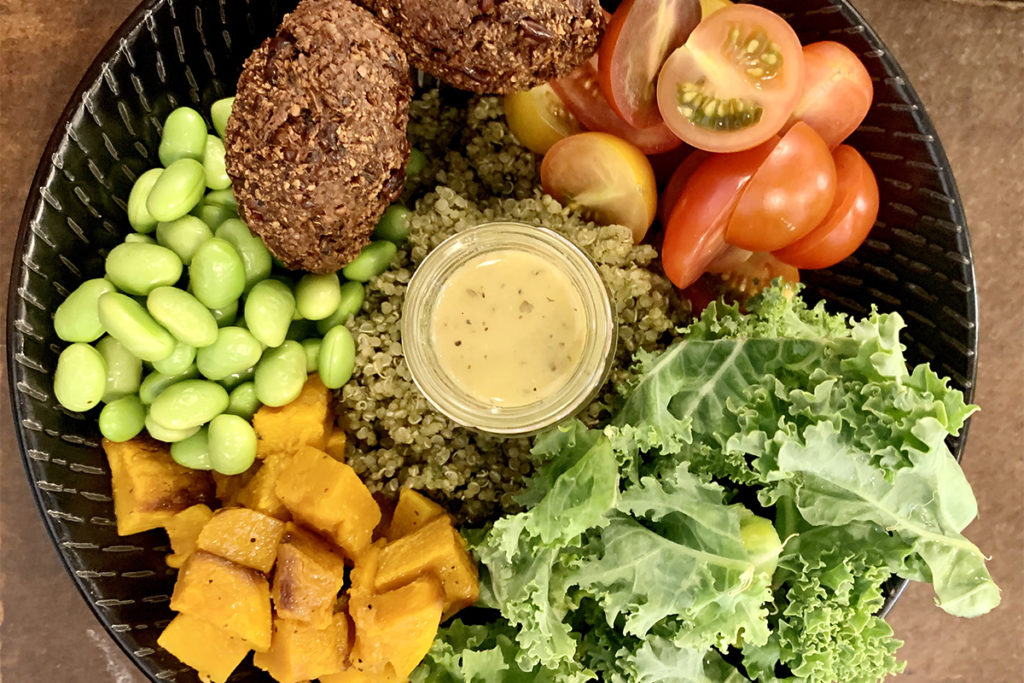The New Frontier of Active Aging Nutrition
8 Trends That Are Shaping Longevity and Wellness

As the population over 50 continues to grow, so does interest in how nutrition can support not just a longer life—but a better quality of life. For fitness professionals, dietitians, and wellness coaches, understanding the latest trends in active aging nutrition is essential for guiding clients toward greater strength, vitality, and independence as they age.
From plant-powered eating to microbiome health and targeted supplements, the conversation around nutrition for older adults is evolving quickly. Here’s a breakdown of the top trends shaping active aging nutrition and how you can apply them in your practice.
Accessible Nutrition: Meeting People Where They Are
Making healthy eating affordable and practical for older adults—especially those with mobility challenges, limited incomes, or limited access to fresh food – is a top concern amongst dietitians, nutritionists and society at-large. Without consistent, easily accessible healthy food, older adults will struggle to maintain health, wellness, fitness and quality of life.
Many older adults may struggle to change life-long eating habits. Encourage them to make small changes, letting them know any amount of positive change is a step in the right direction.
Examples in Action:
- Community-supported agriculture (CSA) boxes delivered to homes
- Frozen, pre-portioned meals designed for seniors
- Partnerships with local food banks or senior centers to distribute fresh produce
What This Means for Professionals: When working with clients, consider accessibility in your recommendations. Offer ideas that are budget-friendly, easy to prepare, and require minimal cleanup. Resources like meal delivery services, meal prep tips, and simple grocery lists can bridge the gap. This could also be a great way to be more involved in your community. Seek out charitable organizations that may need volunteers.

Healthy Aging & Longevity: Food as Preventive Medicine
Understanding how long-term dietary habits influence cognitive function, heart health, bone density, and immune strength will better prepare you to coach clients. The impact of food on longevity can not be emphasized enough. The phrase “food is medicine” is true! A healthy diet can help avoid many health issues commonly associated with aging.
Key Strategies:
- Emphasize whole-food dietary patterns like the Mediterranean or DASH diets
- Educate clients on the connection between diet and brain health
- Encourage anti-inflammatory eating patterns to reduce disease risk
Pro Tip: Help clients move beyond calories and macros to understand how what they eat today affects how they’ll move and feel decades from now.
Targeted Nutrition: Personalized Health Support
Customizing nutrition based on an individual’s health profile—especially as age increases – reduces the likelihood of chronic conditions. While only qualified nutrition professionals should be prescribing customized diets, a fitness professional’s role is important in encouraging utilization of nutrition services and supporting compliance with the plan. If your client displays symptoms or complains of symptoms that could indicate a need for custom nutrition assistance, be sure to have a recommendation ready.
Examples:
- High-protein diets to manage sarcopenia (muscle loss)
- Calcium and vitamin D for osteoporosis prevention
- Omega-3-rich foods for cognitive decline or heart health
- Low-sodium meal plans for hypertension
What You Can Do: Collaborate with healthcare providers when possible. Ask clients about medications, diagnoses, and blood work to tailor suggestions safely and effectively. As always, remember to stay in scope when discussing nutrition with clients.

Plant-Based Diets: A Longevity Ally
Shifting toward more plant-forward meals can help reduce inflammation and chronic disease risk. Research consistently demonstrates that diets abundant in vegetables, fruits, legumes, whole grains, nuts, and seeds are linked to reduced mortality and improved long-term health outcomes. For instance, a study published in Advances in Nutrition analyzed data from over a million participants and found that such a diet is associated with increased longevity.
Similarly, the Alternative Healthy Eating Index (AHEI) diet, which emphasizes these plant-based foods, has been shown to significantly enhance the likelihood of healthy aging. Moreover, plant-based diets rich in these foods have been associated with a significantly lower risk of developing heart disease. These findings underscore the importance of incorporating a variety of plant-based foods into one’s diet to promote overall health and longevity.
Starter Tips for Clients:
- Swap animal proteins for beans or lentils 1–2 times per week
- Add leafy greens to smoothies or scrambled eggs
- Use olive oil, herbs, and spices instead of processed sauces
Diet Patterns to Recommend: Mediterranean, DASH, or Flexitarian—approaches that are flexible and sustainable for older adults.
Functional Nutrition: Using Food with Purpose
Choosing foods and supplements for specific outcomes like joint health, mobility, or mood support is the next step in active nutrition management. Helping your client choose foods higher in certain vitamins and minerals can target more specific goals.
Popular Functional Ingredients:
- Collagen for skin, joints, and connective tissue
- Curcumin for inflammation
- Magnesium for muscle relaxation and sleep
- Vitamin K2 for bone health
- Choline for brain function
Client Coaching Tip: Emphasize that food can be a powerful tool for healing and performance, especially when paired with physical activity and recovery strategies.

The Microbiome: Gut Health Is Whole-Body Health
Supporting healthy gut bacteria to improve digestion, immunity, brain health, and even inflammation is a hot topic currently. Scientists and the nutrition community are finding numerous ways our gut health impacts every aspect of our overall health and body. Maintaining a healthy microbiome starts by eating a diet rich in gut-friendly foods.
Gut-Friendly Practices:
- Increase dietary fiber (beans, whole grains, vegetables)
- Eat fermented foods (yogurt, kefir, sauerkraut, kimchi)
- Reduce ultra-processed foods and added sugars
- Consider probiotics and prebiotic-rich foods
What to Teach: Explain to clients how a healthy gut can enhance their energy, mood, and even resistance to illness. Regularly eating a healthy diet rich can establish a baseline of good wellness practices.
Supplements: Filling the Nutritional Gaps
Using high-quality supplements to correct deficiencies and support unique health needs in aging adults can assist when certain needs are hard to meet with food alone. It’s very important to point out that supplements are not regulated and anyone considering adding supplements to their nutrition plan should discuss the idea with their doctor as well as with a reputable nutrition professional.
Commonly Needed Supplements:
- Vitamin D: Especially in low-sunlight areas or for bone health
- Calcium: For bone density and fracture prevention
- Vitamin B12: Often poorly absorbed with age
- Omega-3s: For cognitive and cardiovascular protection
- Protein powders: To meet elevated needs with less appetite
Best Practices: Recommend clients talk with a healthcare provider before starting new supplements. Help them understand the difference between “insurance” supplementation vs. condition-specific strategies. Again, keep in mind supplements are not regulated! It’s imperative to research any supplement before taking it.

Supporting the Whole Person: Beyond the Plate
Nutrition is essential—but it’s not the only ingredient for healthy aging. The best outcomes happen when food habits are paired with lifestyle strategies like:
- Physical Activity – Encourage resistance training and walking to maintain muscle and bone mass.
- Cognitive Engagement – Promote activities that stimulate the brain, such as puzzles, reading, or learning new skills.
- Social Connection – Support clients in creating social mealtime routines to combat isolation, which can impact both nutrition and mental health.
- Sleep & Stress – Remind clients that sleep quality and stress management are key to optimal digestion, hormone regulation, and long-term health.
The Evolving Role of Nutrition in Aging Well
The world of aging is changing—people want to live not just longer, but better. And nutrition is a cornerstone of that mission. As a fitness or wellness professional, you are uniquely positioned to lead this shift by translating science into sustainable strategies. Whether you’re guiding clients toward more plant-based meals, helping them understand the benefits of collagen or probiotics, or connecting them with community food resources, your role is bigger than ever. Active aging isn’t just about staying alive—it’s about staying strong, sharp, mobile, and connected. And it starts with what’s on the plate.
References
https://www.frontiersin.org/journals/nutrition/articles/10.3389/fnut.2025.1539355/full
https://www.heart.org/en/news/2024/09/27/food-for-thought-how-diet-affects-the-brain-over-a-lifetime
https://people.com/bone-health-20s-and-beyond-11706220
https://www.ideafit.com/inflammation-obesity-diabetes-aging-and-exercise/
https://www.lifespan.io/news/high-protein-intake-associated-with-sarcopenia/
https://www.osteoporosis.foundation/vitamin-d-recommendations
https://www.adelaidenow.com.au/lifestyle/5-signs-youre-not-getting-enough-omega3s-in-your-diet/news-story/bb2b91126aa9a7ef350d23ab62b73c3f





